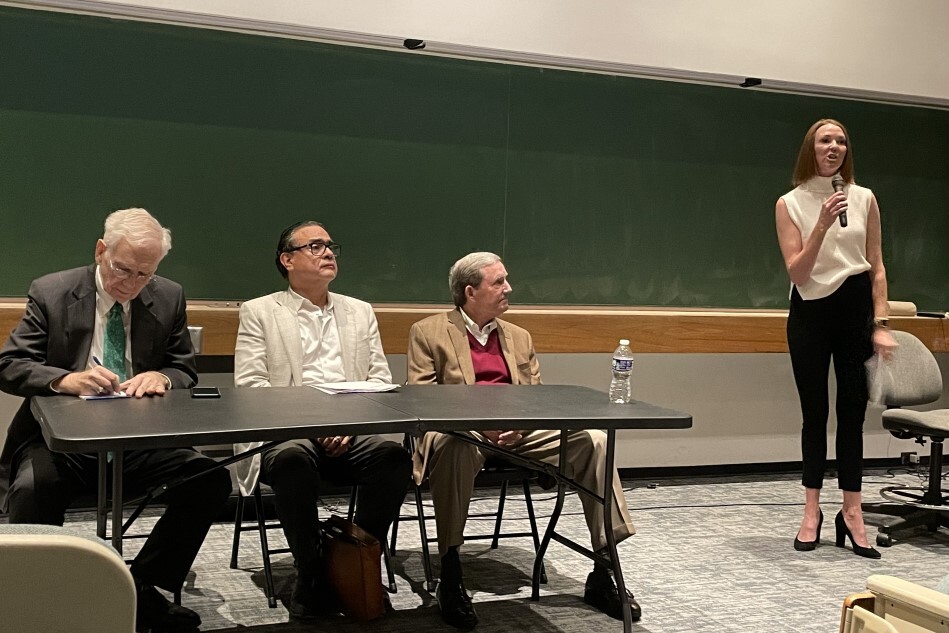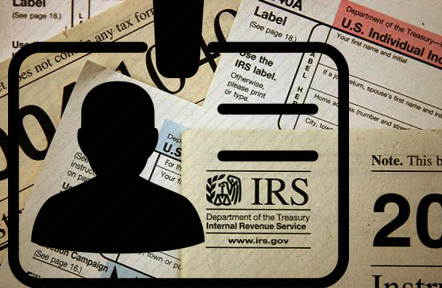"Courtroom" Movie Screening and Panel Discussion Address Immigration Challenges and Solutions
 Immigration experts and business leaders discussed faults of the outdated US immigration system and urged lawmakers to pass bipartisan legislative solutions during a recent gathering at Rice University in Houston. Speakers discussed pitfalls of the legal immigration system, the issues of worker misclassification and payroll fraud, and the ID and Tax policy solution.
Immigration experts and business leaders discussed faults of the outdated US immigration system and urged lawmakers to pass bipartisan legislative solutions during a recent gathering at Rice University in Houston. Speakers discussed pitfalls of the legal immigration system, the issues of worker misclassification and payroll fraud, and the ID and Tax policy solution.
Charles Foster, Chairman of Foster LLP, Jacob Monty, Managing Partner of Monty and Ramirez LLP, and Stan Marek, CEO of MAREK, joined a panel discussion hosted by Chelsie Kramer with the American Immigration Council following the screening of the film “The Courtroom.” The film tells the story of a Filipina immigrant who faces deportation and permanent separation from her American husband and newborn child after mistakenly registering to vote.
All speakers expressed that they enjoyed the film, which highlighted challenges that immigrants face while trying to navigate the complex US immigration system. Monty and Foster pointed out that the story’s happy ending is often not the case for many migrants whose legal immigration options are more limited than Americans may realize.
Monty discussed a similar case in Texas with a different result.
“I was pleasantly surprised, but I gotta tell you here in Texas, I thought it was gonna turn out differently. I followed a case in Fort Worth involving Rosa Ortega who was charged with voting criminally. She took the case to trial, they gave her nine years. She voted in a Republican primary for Mitt Romney and she voted for Ken Paxton. And now she's in removal proceedings up in Dallas… I don’t think there is going to be a happy ending for Ms. Ortega here in Texas,” said Monty.
Foster explained, “the truth is, we have an extremely restrictive legal immigration system. Throughout my career there’s been one common denominator, it’s become more restrictive, the backlogs and processing have only grown, fees have gone up, and there’s been worse service. But the key part of that is, which most Americans do not really have to think about because most of us did not use the system, is that it's very hard to legally immigrate to the United States, and it's heavily weighted toward family reunification… for immediate family members, spouses, children, and parents.
“Immigrating through employment, it's heavily weighted toward professionals at the top of the food chain… That system is broken because Congress in the 1990s restricted the number of H-1Bs. So effectively, even the brightest people who graduate from Rice or Harvard, they may have only a 20% chance of remaining legally in America,” said Foster.
In response to a question from Kramer about what options unauthorized immigrants have to “get in line” for legal status, Foster explained that the immigration system currently provides no viable pathways for them to earn work permits before or after they enter the US.
“There is no system for low-skilled workers. And often politicians will say, well, these people should go back and get in line. But that’s not true. There is no line. You cannot just go back and get in line and come in legally. And even if there were visa numbers available, thanks to Lamar Smith, there is a provision in the law now… that says if you've been illegally in the US for more than a year, even if you qualify through marrying US citizen, you go back, you would have to wait ten years before a visa could be issued to you. Ever since that law passed, which is very interesting, I've never had a single client go back because if you've been here, why would you go back to apply legally for a visa if you had to wait ten years before it could get issued?” said Foster.
Marek, who works in construction, shined a light on how workforce shortages and the lack of a method for immigrant workers who are filling open jobs to obtain work permits has exacerbated worker misclassification and payroll fraud in the industry. Most unauthorized immigrants work as independent contractors or off the books. By hiring these workers through subcontractors as independent contractors, employers avoid paying federal taxes and providing health insurance and workers comp, he explained. This cheats taxpayers and degrades the industry.
“What we need to realize as business owners, business leaders, CEOs, and major public boards, is that it's our responsibility, because many of those 20 million undocumented people are building buildings here on Rice. I guarantee you that 25% of the people on those jobs are illegal. They’re working under a fake social, or they're working as an independent subcontractor, and they're working because they want to. That’s the only way they can work. They want to pay taxes. They want to be protected by our American laws, wage and hours, etc. But they don't have that opportunity. And the same way with cleaning services. Go downtown right now and see how many young Latinos with their parents are going in to clean the buildings for the major CEOs, for Chevron, for Exxon. They're all independent subcontractors. They work for a service who cooks the food, who cuts your yard, who does the childcare,” said Marek.
“Rice isn't saying, ‘hey, hey, hey, make sure all those people on that job are W-2 employees paying taxes, safety training, overtime, and treated right.’ You know what would happen if they did that? There wouldn’t be a project built in Texas or the Southeastern United States or the Midwest…And I've confronted my homebuilder buddies about it, and they say, ‘whoa, Marek, wait a minute. Get off your horse. Workman’s comp is a government problem. Payroll taxes are the government’s problem. I'm not enforcing the law. I'm building the citizens of Texas a house as cheaply and as good as I can do it. Don't tell me about the government. It's broken.’”
As a solution to increase fiscal revenues and level the playing field for law abiding businesses and workers, Marek called on more business leaders to join in him in putting pressure on lawmakers to pass a bipartisan ID and Tax bill to allow long time unauthorized immigrants to earn legal status. Readers can learn more about the ID and Tax proposal from the Rational Middle of Immigration short films.
“If they’ve been here 10 years and they can pass a background check, employers would be able to hire them and put them on a W-2 payroll and pay taxes,” he said while noting it doesn’t have to be a politically infeasible path to citizenship.
Coupled with border security improvements and increased enforcement against worker misclassification and payroll fraud, such a policy would improve employment standards and wages for all Americans. It would also generate an estimated $4.75 billion in annual federal taxes per million workers taken out of the underground economy and put on a payroll.








